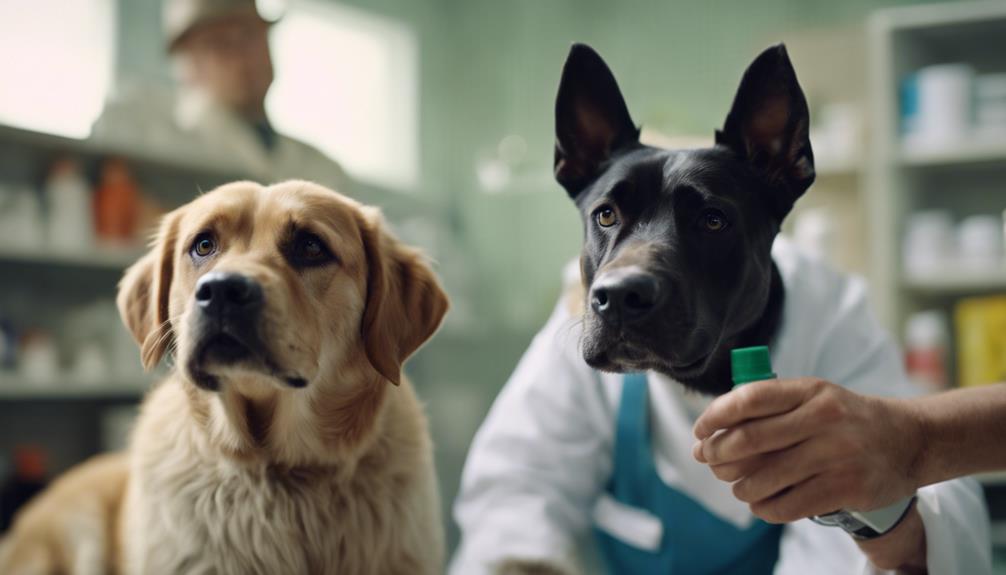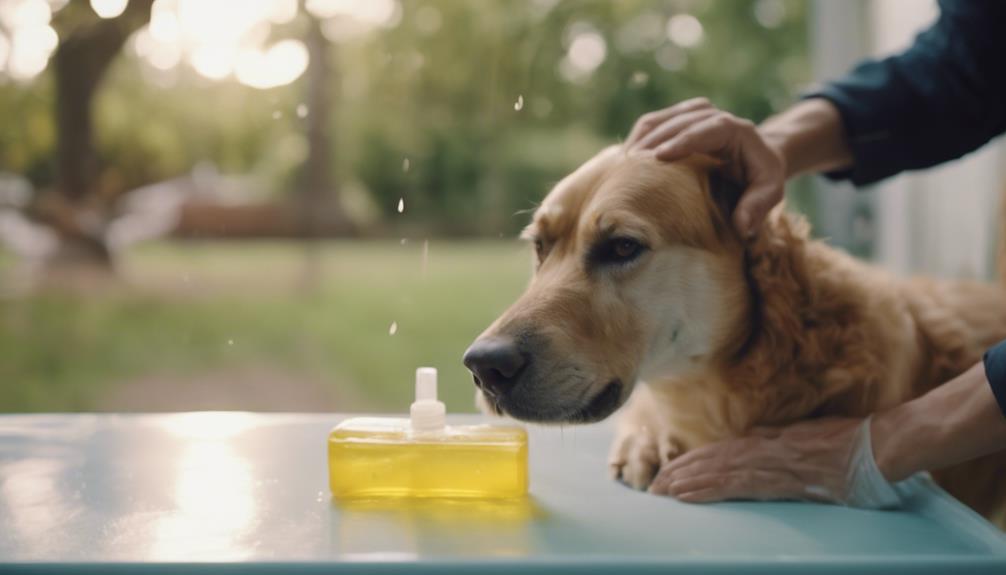As pet owners strive to prioritize their furry companions' well-being, the question of citronella's safety for dogs remains a pertinent concern. While citronella offers a natural solution to repelling pests like mosquitoes, its implications on canine health necessitate careful consideration.
A veterinarian's perspective on this matter can provide invaluable insights into the potential risks, safe usage practices, and alternative options available to conscientious pet owners. By exploring the nuances of citronella's impact on dogs, this discussion seeks to illuminate the complexities surrounding its use and equip readers with essential knowledge to navigate this aspect of pet care responsibly.
Key Takeaways
- Citronella products can be harmful to dogs if ingested or inhaled.
- Use safer alternatives like basil or rosemary to repel pests effectively.
- Consult a vet before using citronella-based products on your dog.
- Prioritize your dog's safety by avoiding unsafe bug sprays and products.
Citronella: Definition and Sources
Citronella, a natural pest repellent derived from citronella grass and scented geranium, serves as a popular choice for warding off mosquitoes.
Citronella grass, also known as Cymbopogon nardus, produces citronella oil, which is a key component in many insect repellent products due to its strong scent that masks attractants to mosquitoes.
Scented geraniums, specifically Pelargonium citrosum, emit a similar aroma to citronella but do not contain the same repellent properties.
The combination of these two sources creates an effective deterrent against mosquitoes, making citronella a widely used natural solution for insect control.
Its plant-based origins appeal to those seeking alternatives to chemical repellents, promoting a more eco-friendly approach to pest management.
Potential Risks of Citronella Products
When considering the use of citronella products for pest control, it is essential to be aware of the potential risks associated with their application on dogs' health and well-being.
- Citronella ingestion can lead to gastrointestinal issues.
- Inhaling citronella fumes from candles may be harmful.
- Essential oils from citronella can cause GI symptoms and skin irritation.
- Keep citronella products out of reach to prevent accidental ingestion.
- Consult a veterinarian before using citronella-based products on your dog to ensure their safety and well-being.
Effects of Citronella on Dogs

The impact of citronella on dogs' well-being and health requires careful consideration due to potential adverse effects associated with its use. When exposed to citronella, dogs may experience gastrointestinal issues and skin irritation. To provide a clearer understanding, let's explore the effects of citronella on dogs through the following table:
| Effects of Citronella on Dogs | Potential Impact |
|---|---|
| Gastrointestinal Upset | Vomiting, Diarrhea |
| Skin Irritation | Itching, Redness |
| Respiratory Distress | Coughing, Wheezing |
| Neurological Symptoms | Disorientation, Tremors |
| Allergic Reactions | Swelling, Hives |
Preventing Citronella Exposure in Dogs
To safeguard dogs from potential health risks associated with citronella exposure, pet owners must implement proactive measures to prevent their pets from coming into contact with citronella-based products.
- Store citronella candles and oils in secure cabinets or areas inaccessible to dogs.
- Use citronella products outdoors in well-ventilated spaces away from pets.
- Consider alternative pest repellents safe for dogs, such as basil or rosemary.
- Keep citronella plants out of reach or opt for citronella-free geraniums.
- Educate family members and visitors about the risks of citronella exposure to dogs.
Consulting a Veterinarian

To ensure the well-being of your dog when considering the use of citronella-based products, seeking guidance from a qualified veterinarian is paramount. A veterinarian can provide personalized advice based on your dog's health status, age, and any pre-existing conditions. They can help assess the potential risks and benefits of using citronella around your pet. Additionally, veterinarians can recommend safe alternatives for pest control if citronella is deemed unsuitable for your dog. Consultation with a professional ensures that you make informed decisions regarding your dog's health and safety.
| Benefits of Consulting a Veterinarian |
|---|
| Personalized advice based on pet's health |
| Assessment of risks and benefits |
| Recommendations for safe alternatives |
Safe Alternatives for Pest Control
Exploring safer pest control alternatives for dogs involves researching effective and pet-friendly methods. When looking for alternatives to citronella, consider the following options:
- Basil: Planting basil around your home can help deter pests like flies and mosquitoes.
- Catnip: Catnip contains nepetalactone, a natural mosquito repellent that is safe for dogs.
- Lemon Balm: This herb emits a strong scent that can repel insects while being non-toxic to pets.
- Rosemary: Planting rosemary bushes can act as a natural insect repellent and also add flavor to your cooking.
- Peppermint: Peppermint plants can repel spiders, ants, and even rodents, making them a pet-friendly pest control option.
Herbal Repellents for Dogs

When considering herbal repellents for dogs, incorporating natural options like basil, catnip, lemon balm, rosemary, and peppermint can effectively deter pests while ensuring the safety of your pet. These herbs have natural properties that mosquitoes and other pests find unpleasant, making them ideal alternatives to chemical-based products. Here is a comparison of these herbal repellents:
| Herb | Repellent Properties | Application Methods |
|---|---|---|
| Basil | Repels mosquitoes | Planting in the yard |
| Catnip | Effective against fleas and ticks | Rubbing leaves on fur |
| Lemon Balm | Repels mosquitoes and ticks | Making a herbal spray |
Comparing Effectiveness of Repellents
Considering the efficacy of various repellents is crucial when selecting the most suitable option for safeguarding your pet against pests. When comparing repellents for dogs, keep in mind the following:
- Permethrin-based products: Highly effective at repelling a wide range of pests.
- Herbal alternatives (basil, catnip, lemon balm, rosemary, peppermint): Natural options that can deter pests, but may be less potent.
- DEET-based products: Avoid using these as they can be unsafe for dogs.
- Essential oil products: Can repel mosquitoes, but efficacy varies.
- Consult a veterinarian: Before choosing a repellent, seek professional advice for the best option for your pet's safety and well-being.
Caution With DEET Products

Exercise caution when using DEET-based products on dogs due to their potential harm to pets. DEET, a common ingredient in many insect repellents for humans, can be toxic to dogs if ingested or absorbed through the skin. Dogs are more sensitive to DEET than humans, and exposure can lead to symptoms like vomiting, drooling, lethargy, and tremors.
Avoid applying DEET products directly on your dog, as they may lick the product off their fur. When using insect repellents around pets, choose those specifically formulated for animals and consult with a veterinarian for guidance. It's crucial to prioritize your dog's safety by preventing their contact with DEET-based products and opting for safer alternatives to protect them from insects.
Vet Consultation for Bug Sprays
Seeking guidance from a veterinarian is imperative when contemplating the use of bug sprays on your pet. Before applying any bug spray on your dog, schedule a consultation with a vet to ensure the product's safety and efficacy. Here are some essential points to consider during your vet consultation:
- Discuss your dog's specific health conditions and any allergies they may have.
- Inquire about the appropriate concentration of bug spray suitable for your dog's size and breed.
- Seek advice on how frequently the bug spray can be applied without causing harm.
- Confirm if there are any specific application techniques or areas to avoid when using bug sprays on your pet.
- Ask about potential side effects or symptoms to watch for after applying bug spray on your dog.
Safety Measures With Dawn Soap

When ensuring the safety of pet products, including bug sprays, pet owners should also be cautious about the use of Dawn dish soap on dogs and seek guidance from a veterinarian for suitability.
While Dawn dish soap is commonly used for cleaning animals during oil spills, it may not always be the best choice for regular pet bathing. The concern lies in the potential skin irritation and drying effects due to the soap's strong degreasing properties.
If Dawn is the only option available, diluting it significantly and rinsing thoroughly can help reduce the risk of skin irritation. However, consulting a veterinarian for advice on alternative pet-safe shampoos is recommended to maintain your dog's skin health and overall well-being.
Monitoring Adverse Reactions
Vigilantly monitoring for adverse reactions in dogs following exposure to citronella-based products is crucial for ensuring their well-being and prompt management of any potential health concerns. To effectively monitor your dog for adverse reactions, consider the following:
- Observe behavior: Watch for signs of lethargy, vomiting, diarrhea, or excessive drooling.
- Check skin: Look for any redness, irritation, or unusual reactions on your dog's skin.
- Monitor respiratory signs: Pay attention to coughing, sneezing, or difficulty breathing.
- Assess appetite: Note any changes in your dog's eating habits or appetite.
- Contact vet: If you notice any concerning symptoms or behaviors, seek immediate veterinary advice for proper evaluation and care.
Conclusion
In conclusion, understanding the potential risks of citronella products and their effects on dogs is crucial for pet owners.
Implementing safety measures, such as preventing exposure, consulting a veterinarian, and using alternative repellents, can help mitigate any adverse reactions in dogs.
It is essential to prioritize the well-being of pets when considering the use of citronella-based products for pest management.




